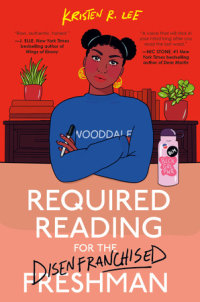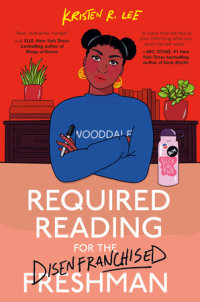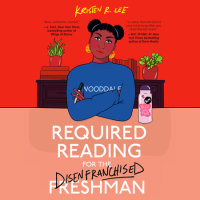Required Reading for the Disenfranchised Freshman
A striking debut novel about a college freshman grappling with the challenges of attending an elite university with a disturbing racist history, which may not be as distant as it seems.
"A searing debut.” –Entertainment Weekly
Savannah Howard thought everyone followed the same checklist to get into Wooddale University:
But now that she’s on campus, it’s clear there’s a different rule book. Take student body president, campus royalty, and racist jerk Lucas Cunningham. It’s no secret money bought his acceptance letter. And he’s not the only one. Savannah tries to keep to head down, but when the statue of the university’s first Black president is vandalized, how can she look away? Someone has to put a stop to the injustice. But will telling the truth about Wooddale’s racist past cost Savannah her own future?
First-time novelist Kristen R. Lee delivers a page-turning, thought-provoking story that exposes racism and hypocrisy on college campuses, and champions those who refuse to let it continue.
An Excerpt fromRequired Reading for the Disenfranchised Freshman
one
The pizza drivers don’t deliver here after seven.
Five in the wintertime, when the sun sets earlier. When they do deliver, they don’t come beyond the iron gates of my building. We have to walk down to them. They park damn near around the corner, but they still expect a tip.
I have a tip for them: stop being afraid of Black folk.
I search for my low-top Air Force Ones that I’ve been wearing since ninth grade. Mama taped up the bottom with duct tape to keep the soles from falling apart. She tells me all the time to throw them away, that no matter how poor we are, we don’t have to look it, but I can’t toss them. These same shoes took me everywhere, and in a few days they’ll be coming with me to college. A college I’ve worked my whole life to get into but, truth be told, I don’t want to go to. Not like Mama would give me a say anyway.
“Mama, I’m finna go get a pizza.” I stand behind the bedroom door that hangs off the hinges. She takes her sweet time inviting me in. I know better than to enter her room without permission.
“Bring me a pepperoni with extra cheese,” she says.
You got extra-cheese money? I want to say, but I don’t have time for a lecture. I lean against the wall. “You know they charge more for the extra cheese, Mama?”
“I know that, Savannah. Come get twenty dollars out my pocketbook.”
The door hugs my body as I rest it on the wall. Mama sits on the edge of her bed, and the cutoff shirt she wears shows the aging in her arms. Soft pink rollers that give her hair a “bump” peek out from underneath her bonnet. Her swollen feet rest in one of them massage buckets boosted from Walmart by my cousin Shaun. Mama’s feet ain’t no good anymore. Years of standing up on concrete at a warehouse for twelve hours did a number on her body. When she got that good job down at the tax agency, she ran into the house and threw out every pair of steel-toe boots she ever owned. But by then the damage to her feet was already done.
“Don’t be out too late. It ain’t safe.” She gives the same warning each time I step outside. Even if I’m only going toward the back of the apartments to throw out the trash.
“Mama, it’s right up the street.” I pause. “Besides, you can’t keep an eye on me after I’m at college.”
It feels funny saying that. Me? College? I’m only seventeen—well, seventeen and a half. One minute I was doing accelerated-learning courses, then dual-enrollment classes, and then the guidance counselor talking about I’m ready for college, if I want to go. I worked like a senior my sophomore and junior years to apply to the best colleges—like Wooddale. Getting into Wooddale meant I made it. That Mama working them long hours wasn’t in vain. While my homegirls went to parties, I was prepping for the SAT night and day. It worked because I got a 1500 and accepted to every college I applied to, including the HBU down the street. But Mama said I’m not going to that one because it won’t make me successful. Even though people who graduate from HBUs do big things too.
She said I need that fancy Ivy League degree.
And I mean, she right. Life would be so good then. If I got a good enough job with that Wooddale degree, we could even move. Mama wouldn’t be worried about crime or nothing. Bet wherever we move then, the pizza people would deliver all the way to the doorstep.
Mama points her half-polished finger at me. “You heard what I said. I don’t want you walking them streets this late at night.”
I reach into her purse and pull out an Andrew Jackson. I crumple it up and put it in my bra. Mama taught me to never stick money in my pockets. It’s the first place robbers look.
“Aight, Mama. Yes, ma’am.”
I walk down the stairs and exit my building. Little kids sit out in the patches of brown grass playing hand games with silly chants. I grin. It reminds me of my own childhood.
Summer as a kid was lit.
Staying out all day, riding my bike with the pink tassels coming out the handles. Playing jacks on the porch, if you can call the slab of concrete that. Next day I would wake up and do the same thing over again until school started up in August. Then for at least eight hours I was guaranteed two meals and an air-conditioned place to stay.
My Wooddale degree gone change that, too.
“Savannah, wait up.” B’onca, my homegirl since grade school, runs over from the basketball court. “I ain’t know you’d be ready so soon. Where we going anyway?”
Meeting B’onca to say my goodbyes is bittersweet. We as good as sisters. Our mamas were best friends growing up—they still are. When you see B’onca, you see me, and vice versa. Pictures of us from pigtails to our first grown-up wraps decorate our refrigerators.
“Figured we’d get pizza.”
“Oh snap, pizza? That’s fancy.” She wipes her chiseled face with the bottom of her shirt. “Your mama must got her food stamps.”
“Nah, we got cash money today.” I pat the soft spot in my bra. “We getting Marco’s. Real pizza today. Not from the corner store.”
“Cool.” She looks behind her at her building. Her brows meet. “But I gotta be home . . . soon.” Sweat glistens across her chest, and her ombré black-and-brown dreads fly in the wind behind her. She’s in the National Honor Society and used to play ball, and not only basketball, neither. Her grades are as on point as her jump shot. B’onca soared in everything she did. Then, in high school, she met Scooter, her boyfriend, and quit all sports. Scooter says his woman ain’t gone be “manlier” than him. I told her that’s wild, but she in love, and love overrule anything I have to tell her.
“You good?”
“Yeah. But hold up, one minute.” She sprints to the court and picks up her basketball. Scooter must not be around. If he was, she’d be at his house playing wifey. Cooking him chicken, watching Netflix, and folding his drawers. Her nose wide open, like the old folks say.
My foot taps the pavement as her teammates try to convince her to stay and play. If you got B’onca on your team, ain’t no way you losing. She runs over, dribbling. “Aight, let’s go. We good.” She catches up to me. “You sure you need pizza?” She pinches the rolls in my stomach, and I slap her hand away.
“Fuck out of here. I’m depressed and food helps.”
She twirls her basketball around on her middle finger. “Shoot, depression a white-folk thing. You just sad you leaving me, that’s all.” B’onca kicks at a stray hot-fry bag on the sidewalk. “ ’Cause I know you not sad you leaving this ghetto-ass place.”
“I’m only seventeen, B. What I know about college? Living on my own?”
“With how much your mama works, you’ve been practically living on your own since you were what? Fourteen? It ain’t gone be that different. Just this time your mama and best friend”—she nudges me with her elbow—“won’t be right up the street.”
Five months ago when I got the acceptance letter in the mail, Mama musta hollered somethin’ fierce. The next-door neighbor, Mrs. Hall, ran over with her walking cane. She waved it in the air, ready to fight off intruders. She did the same shit when the financial-aid package followed.
“A full scholarship!” I can still hear the Mariah Carey level of Mama’s scream. That’s what my lack of a life in high school got me. And even I couldn’t fight the tears that day, opening the mail. I’m proud. I have something nobody round here has ever had. Something I haven’t seen nobody who look like me do.
Both letters are on the refrigerator, placed behind old Shop & Save grocery coupons and Pillsbury Doughboy magnets. Wooddale’s acceptance letter covers the one from Hilbert. Hilbert University, the local historically Black college ten miles away. Mama said it would be real foolish of me to turn down a paid-for university like Wooddale for a school that can’t even afford financial aid for every student. Wooddale one of the top schools in the country, while Hilbert don’t even make those kinds of lists.
She doesn’t understand, though, that my friends from the neighborhood and folks who resemble me attend Hilbert. I scrolled Wooddale’s Instagram hashtag the other day and counted on one hand the number of Black folk posting pictures. They don’t look like the type of folks I’d hang out with. But I want to make my family proud of me—especially Mama.



